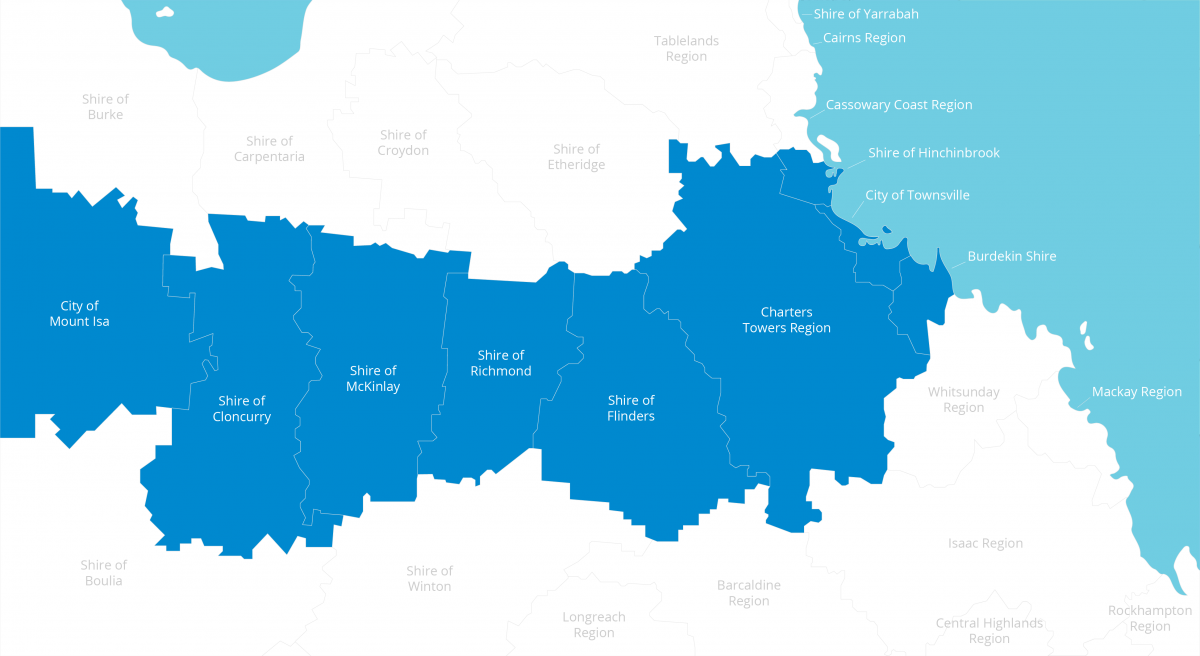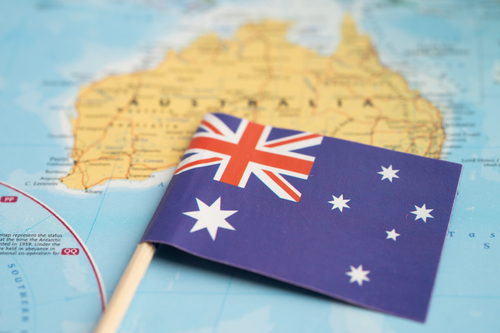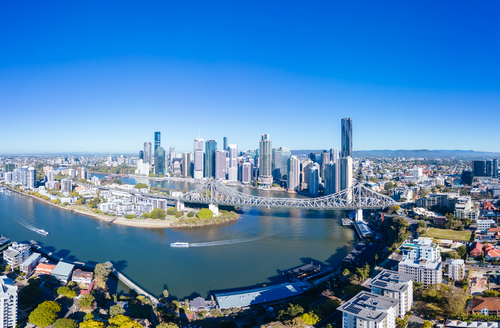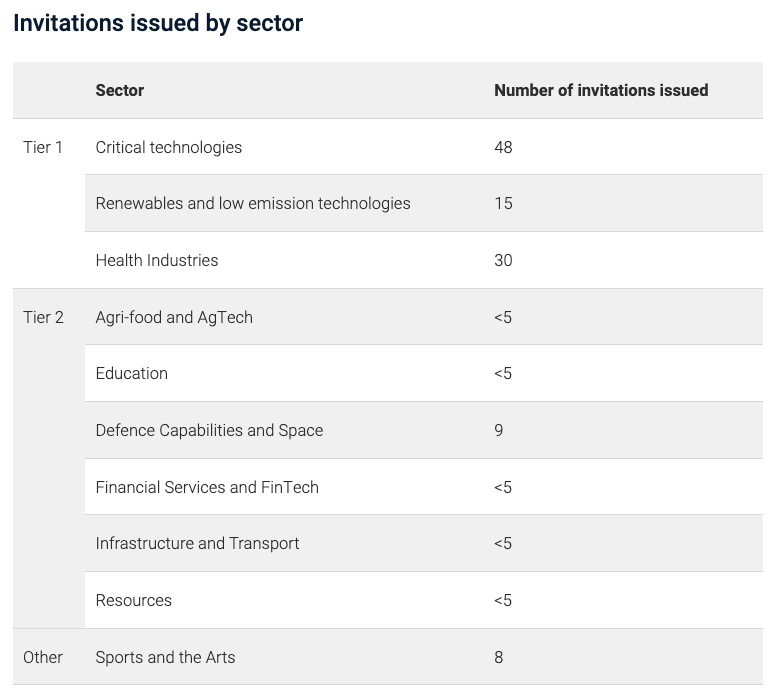FREE in-person seminar on Australia’s National Innovation Visa (NIV) in Singapore on 4 March
If you are a high-achieving professional, entrepreneur, or investor based in Singapore, this may be one of your best opportunities to migrate to Australia.
On 4 March 2026, Chris Johnston, Australian Immigration Lawyer and founder of Work Visa Lawyers, will be in Singapore to host a free in-person seminar on Australia’s National Innovation Visa (NIV).
This is a one-night-only event, with limited seats, and registration is required.
What is the National Innovation Visa?
The National Innovation Visa (NIV) is an Australian direct permanent residency visa designed for exceptional candidates with:
- Exceptional professional achievements
- International recognition
- Proven innovation, investment, research, or business impact
The NIV has replaced the Global Talent Visa and is one of the most powerful PR pathways to Australia.
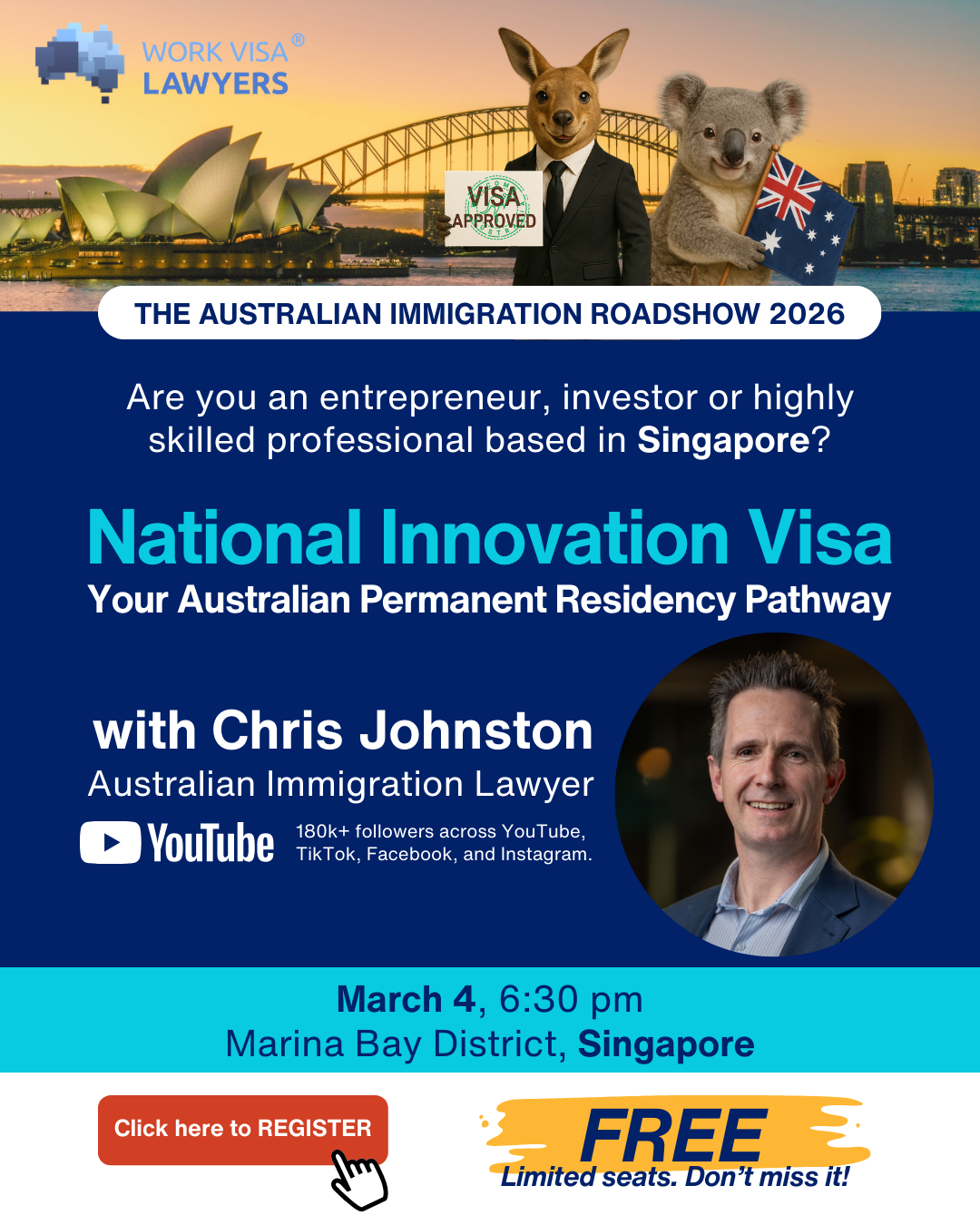
Event Details
National Innovation Visa (NIV) – Singapore Free Seminar
📍 Singapore
📅 4 March 2026
🕖 6:30 pm (Registration) | 7:00 pm (Event starts)
📍 Location: Pan Pacific Singapore, Marina Square
🎟 FREE registration through the following link: https://www.eventbrite.com.au/e/australias-national-innovation-visa-niv-free-seminar-tickets-1983328944262
Presenter:
Chris Johnston, Australian Immigration Lawyer
- 20 years’ experience in Australian migration law
- Has assisted many Global Talent and National Innovation visa applicants to move to Australia
One night only. Once seats are filled, registrations will close.
Who should attend?
This seminar is designed for:
- Entrepreneurs and startup founders
- Investors, angel investors, and innovative investors
- High-performing professionals in:
Critical technologies – including artificial intelligence technology, cyber security technology, quantum technology, advanced information and communication technology, robotics and autonomous systems.
Health industries – including biotechnology, genomics, pharmaceuticals and precision medicine, artificial intelligence in health, and medical science manufacturing for therapeutic products.
Renewables and low emission technologies – including renewable energy generation, clean energy technology, renewable hydrogen, emissions reduction and carbon storage, and processing and refining of critical minerals.
Financial Services and FinTech – including blockchain engineering, cloud technologies, FinTech cyber and data security, financial data science and analysis, innovations in application programming, and software engineering.
Check out our Global Talent client reviews on our YouTube channel: https://www.youtube.com/watch?v=MnPnFGrV8OM&list=PL1jMey0Gj7LnkMvK8032evhfp8i2-sXlz
Why you should not miss this seminar
- Learn how the National Innovation Visa really works in practice
- Understand whether the NIV is realistic for your profile
- Rare opportunity for a face-to-face session with an Australian immigration lawyer
- Chris Johnston will be in Singapore for a very limited time
This seminar is designed to help you avoid costly mistakes and assess your options before you act.
What you will learn
During the session, Chris will cover:
- What the National Innovation Visa is (and is not)
- Who is actually getting invited
- Common mistakes that can kill an application
- How nominations and Expressions of Interest (EOIs) work
- Lessons learned from the Global Talent Visa
- Alternative Australian PR pathways if the NIV is not suitable
Why people living in Singapore are moving to Australia
Singapore is widely recognised as Asia’s leading hub for innovation, finance, and global business. It attracts thousands of high‑performing professionals, founders, researchers, and senior executives from around the world.
However, many of these highly skilled individuals are now choosing to relocate to Australia primarily because Australia offers long‑term stability, a clearer pathway to permanent residency and citizenship, and greater security for their families.
In contrast, Singapore’s immigration framework does not guarantee permanent residency, even for exceptional talent. Professionals can live and work in Singapore for many years without ever securing long‑term status, creating uncertainty about their future.
Australia, on the other hand, provides a more predictable and accessible route to permanent residency, making it an appealing alternative for those who want stability, family security, and long‑term settlement options.
Beyond visa certainty and long-term stability, many professionals living in Singapore are also drawn to Australia’s lifestyle. Australia offers a more relaxed pace of life, access to open spaces, beaches and nature, and a strong emphasis on work–life balance.
Families are attracted to the outdoor culture, reputable education system and child-friendly environment, while professionals value the opportunity to build their careers without sacrificing personal wellbeing. For many, Australia represents not just a migration outcome, but a lifestyle upgrade.
Another major reason for the shift is access to healthcare. Australia offers comprehensive medical services through both public and private hospitals—benefits that non‑citizens in Singapore typically cannot access in the same way.
Australia is also one of the most multicultural nations in the world, home to millions of people from over 200 countries. Its strong focus on inclusivity, diversity, and community support helps newcomers feel welcomed and integrated from the start.
Who is Chris Johnston?
Chris Johnston is an Australian Immigration Lawyer with 20 years of experience in migration law. He founded Work Visa Lawyers in 2011 and has helped thousands of individuals and businesses secure Australian visas, including skilled, employer-sponsored, partner, business, global talent, and innovation visas.
He is a leading educator in Australian migration law, delivering CPD-accredited training for the Migration Institute of Australia and the Law Society of South Australia, and currently serves as the South Australia President of the Migration Institute of Australia.
Chris is also one of Australia’s original immigration content creators, with 180,000+ followers across YouTube, TikTok, Instagram, and Facebook, known for explaining complex migration law in a clear and practical way.
Free registration – limited seats
This event is free, but places are strictly limited and expected to fill quickly.
👉 Register now to avoid missing out.
Disclaimer
This seminar provides general information only and does not constitute legal advice.
Eligibility is assessed on a case-by-case basis.







